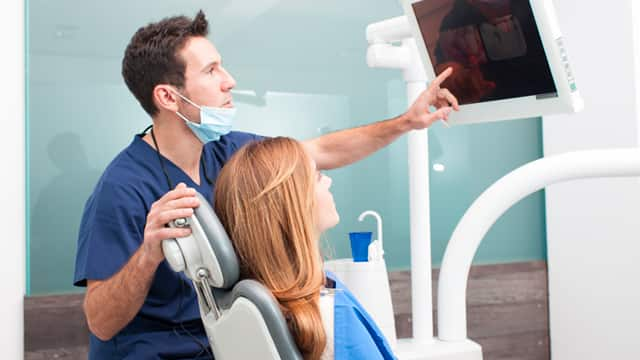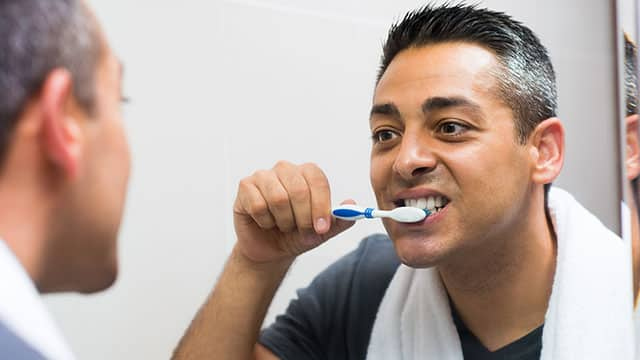Dental Implant Overview
Dental implants are a high-tech solution used to replace your missing teeth. Your natural tooth root is replaced with a titanium screw that fuses to your jawbone during the implant process. This titanium “root” acts as an anchor for a dental restoration, typically either a crown, bridge, or dentures.
These permanent solutions can improve your chewing and speaking ability, along with your look. Even better, they don’t get cavities (but still require proper care to avoid other problems)!
Reasons your dental professional may recommend dental implants include:
- Cavities
- Fractured or broken teeth
- Excessive tooth wear from grinding your teeth (also known as bruxism)
- Injury
Helpful tip: If you’re considering implants, it’s a great idea to consult with your dental professional regarding your risk factors that affect your chance at complications. They should outline the chances of success and help you weigh if the procedure is a good option for your individual needs.
Problems With Implants
According to the Cleveland Clinic, implants are considered safe, and there’s only a 5% chance that you will reject your implant. Although these risks are usually slight and can be treated by your dental professional, various complications can arise.
Complications of dental implants can include:
- Infection around the implant
- Damage to blood vessels, teeth, or other tissue
- Nerve damage leading to pain, numbness, or a tingling sensation
- Issues with your sinuses (in cases where the implant is placed in the upper jaw)
The full process of getting dental implants can take several months as it can include tooth extraction, preparation, implantation, healing, and placement of the restoration. For this reason, it’s vital to give yourself the best chance of successful healing and integration of the implant with your natural bone.
Your risk for complications may be increased if you:
- Are in poor health, regardless of age
- Smoke or use tobacco products
- Have diabetes, leukemia, or other chronic illness
- Received radiation therapy in the past
- Do not follow the aftercare instructions by your dental professional carefully.
- Do not take medications as prescribed.
Important note: We recommend contacting your dental professional if you experience signs of infection, unusual swelling, pain, or have a difficult time chewing or speaking after your implant procedure.
Treatment and Prevention
Implants can provide a solution for the rest of your life for some, while others experience complications or require additional treatment. Even though the implants and restoration are not natural teeth, your diet and oral care routine are still essential in maintaining your health and their long-term success.
Treatment for complications like loosening or infection typically includes removal and reimplantation by your dental professional. It may reassure you to know that even if your implant fails, reimplantation is successful about 90% of the time.
You can reduce your chance of complications with dental implants by:
- Avoiding smoking and tobacco products
- Preventing gum disease through proper diet and oral care
- Brushing for two minutes twice daily
- Cleaning between your teeth using a flossing device once daily
- Scheduling regular visits with your dental professional
- Properly caring for your dental restorations.
- Don’t grind your teeth (consider a mouthguard at night to help reduce the damage)
If you’re experiencing discomfort or a small amount of swelling after your procedure, there are some home remedies you can make use of. It’s important to remember that reducing pain doesn’t treat its underlying cause, so it’s important to consult your dental professional.
Steps to reduce discomfort following dental implantation:
- Rinse with a mix of 3% hydrogen peroxide and equal parts water, or antibacterial mouthrinse
- Avoid hard, sticky, or chewy foods that could irritate your sensitive mouth.
- Take over-the-counter medications as instructed on the packaging.
- Use a cold compress or ice pack by applying it to the affected area outside your cheek for 20 minutes, three times a day.
Dental implants have positively affected the lives of many, thanks to the ability of titanium to integrate into your bone. Even though your restorations can't get cavities, it's vital to maintain a proper diet and dental routine to avoid complications. By reading this article, you've acquired a comprehensive understanding of dental implants' benefits and risks.
Oral Care Center articles are reviewed by an oral health medical professional. This information is for educational purposes only. This content is not intended to be a substitute for professional medical advice, diagnosis or treatment. Always seek the advice of your dentist, physician or other qualified healthcare provider.
ORAL HEALTH QUIZ
What's behind your smile?
Take our Oral Health assessment to get the most from your oral care routine
ORAL HEALTH QUIZ
What's behind your smile?
Take our Oral Health assessment to get the most from your oral care routine















